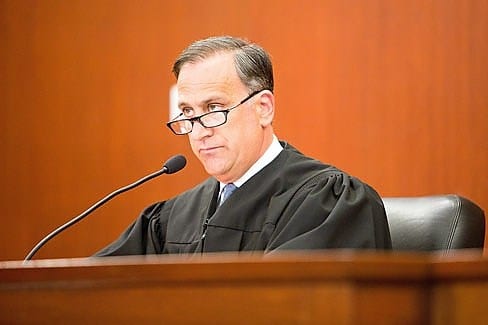Judge: Executive Orders Require Legislative Approval

Audio By Carbonatix

Judge Thomas Moukawsher. CTNewsJunkie file photo
Judge Thomas Moukawsher, in issuing a decision Monday regarding the mask mandate for students and teachers, also concluded that the Legislative branch has an obligation to oversee the ongoing emergency actions of a governor.
By Hugh McQuaid, CTNewsJunkie.com
A Connecticut Superior Court judge issued a stunning, if potentially hypothetical, check on Gov. Ned Lamont’s pandemic-related emergency powers Monday, in a 36-page judgment that may be supplanted by expected guidance from the state Supreme Court.
Judge Thomas Moukawsher issued a decision Monday on a complaint contesting the state mandate requiring students and teachers to wear masks in public schools to slow the spread of the COVID-19 virus.
As he had in prior rulings, Moukawsher maintained that the “mask mandate was a rational response to the COVID-19 crisis.” But in many respects, the judge agreed with the CT Freedom Alliance’s assertion that Lamont’s executive actions – stemming from emergency declarations as a result of the pandemic – require greater oversight by the legislature.
The judge was careful to note that the decision does not require immediate action from the Lamont administration. The Connecticut Supreme Court in December 2020 upheld the governor’s authority in a related case involving a challenge to his executive order closing bars. The high court’s guidance in that case could reframe much of what Moukawsher found in his decision. No written opinion has been issued by the Supreme Court in that case.
But the General Assembly has come back into session since the Supreme Court case and Lamont has extended his emergency authority until April 20 without interference from the legislature.
In the absence of a written decision from the Supreme Court, Moukawsher said the law required some steps to be taken: the governor must submit his orders to the legislature for ratification, there must be time limits to how long the legislature can grant the governor emergency power, and the governor cannot extend his emergency power beyond six months without express approval from the legislature.
In the decision, peppered with poetic turns of phrase like “slipping comfortably into oblivion,” Moukawsher concluded that the Legislative branch has an obligation to oversee the ongoing emergency actions of a governor. That applied even when both branches are of the same parties and share common goals, he wrote.
“After all, it saves time and trouble, and we are generally satisfied with the outcome,” Moukawsher wrote. “It’s only when leaders evolve into masters and masters transform into tyrants that we regret losing the means to keep them in check in the ways enshrined in our founding legal documents. And by then it is too late.”
Moukawsher tossed other elements of the plaintiffs’ case. The mask mandate, he concluded, does not deprive children of their constitutional right to public education. “It is beyond reasonable debate that mask wearing is supported by common sense, scientists, and science,” he wrote.
Meanwhile, he dismissed their assertion that the COVID-19 pandemic did not constitute a “serious disaster” in order to satisfy the statute allowing Lamont to issue his declaration.
“For those inclined toward humanity, this pandemic is irrefutably a serious disaster,” he wrote.
Several times, the judge stressed what his decision did not say. For instance, it did not say Lamont’s orders should be invalidated. He did not agree with the plaintiffs that Lamont and former Education Commissioner Miguel Cardona had been negligent.
“This opinion casts no aspersions on any of the government officials who have struggled in good faith to save lives in this crisis. There is no basis on this record to do so. This opinion passes no judgement on the good faith of any branch of government. This opinion is less about the actions instituted by the government in this particular emergency and more about the institution of government,” he wrote.
While the Supreme Court guidance may upend the decision, the governor has also signaled plans to let his emergency authority expire on April 20 and has suggested his administration would work with lawmakers to ratify orders deemed to be continued necessities.
Republished with permission from CTNewsJunkie.com, all rights reserved.
Like what you see here? Click here to subscribe to We-Ha’s newsletter so you’ll always be in the know about what’s happening in West Hartford! Click the blue button below to become a supporter of We-Ha.com and our efforts to continue producing quality journalism.



